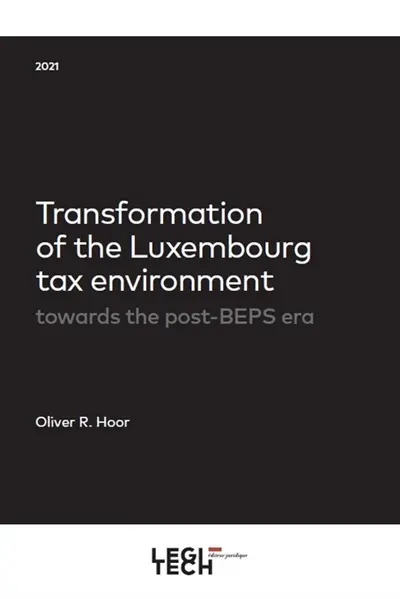en savoir plus

Permet à tous ses détenteurs d'obtenir 5% de réduction sur tous les livres lors du retrait en magasin (réduction non cumulable avec les réductions de type étudiant).
Offre également un certain nombre d'avantages auprès de nos partenaires.
Avec les favoris, retrouvez dans un espace les sélections effectuées au fur et à mesure de vos navigations dans le site.
Constituez pour votre usage personnel vos listes de livres en prévisions d'achats futurs et votre sélection d'articles, dossiers, événements, vidéos ou podcasts préférés ou à découvrir plus tard...
Il suffit simplement de cliquer sur "Ajout Favori" sur chaque page qui vous intéresse pour les retrouver ensuite dans votre espace personnel.
Requiert un compte Mollat
Requiert un compte Mollat
Transformation of the Luxembourg tax environment : towards the post-Beps era
Auteur : Oliver R. Hoor
en savoir plus
Résumé
Récapitulatif de toutes les transformations de l'environnement fiscal luxembourgeois en matière de taxes environnementales suite au projet Beps (Erosion de la base d'imposition et le transfert de bénéfices) de l'OCDE. ©Electre 2026
Quatrième de couverture
Transformation of the Luxembourg tax environment
Towards the post-BEPS era
Over the last years, the Luxembourg tax environment has undergone a comprehensive transformation following the OECD Base Erosion and Profit Shifting (« BEPS ») Project and subsequent initiatives at EU level.
With the transposition of the two Anti-Tax Avoidance Directives (« ATAD » and « ATAD 2 ») and the implementation of other tax measures into Luxembourg tax law, the Grand-Duchy contributed to a level playing field in international taxation. ATAD and ATAD 2 resulted in the implementation of a number of anti-abuse provisions including :
- Interest limitation rules
- Controlled foreign company (« CFC ») rules
- Hybrid mismatch rules
- General Anti-abuse Rule ( « GAAR » )
- Exit tax rules
In addition, the Luxembourg legislator changed in 2019 the definition of permanent establishments (« PE ») and abolished the roll-over relief applicable to conversions of debt instruments into equity.
The Luxembourg transfer pricing regime applicable to companies performing financing activities has already been changed as from 2017, anticipating post-BEPS OECD transfer pricing guidance. Furthermore, as from 2018, the Luxembourg IP tax regime has been amended in order to comply with the modified-nexus approach that has been developed as part of the BEPS Project.
While substance was always an important topic for Luxembourg companies that are frequently involved in cross-border investment and business activities, the focus on economic substance has only increased throughout and following the OECD BEPS Project. Therefore, it is crucial to equip Luxembourg companies with an appropriate level of substance.
The OECD BEPS Project also had a significant impact on the global network of bilateral tax treaties which has been amended through the Multilateral Instrument (« MLI »).The MLI provided contracting states with a lot of flexibility in terms of implementation options and generally resulted in the adoption of anti-abuse provisions such as the principal purposes test (« PPT »).
Last but not least, the Luxembourg legislator implemented the mandatory disclosure regime (« MDR »), transposing DAC 6 into domestic law. Under the MDR, tax intermediaries are required to report information on certain cross-border arrangements to the Luxembourg tax authorities.
This book provides a 360° view on the transformation of the Luxembourg tax environment. The practical guidance in this book will equally benefit tax advisers, practitioners and other professionals that have to deal with taxation.
Fiche Technique
Paru le : 29/06/2021
Thématique : Grands thèmes droit public
Auteur(s) : Auteur : Oliver R. Hoor
Éditeur(s) :
Legitech
Collection(s) : Non précisé.
Série(s) : Non précisé.
ISBN : 978-2-919782-85-7
EAN13 : 9782919782857
Reliure : Broché
Pages : 498
Hauteur: 24.0 cm / Largeur 16.0 cm
Épaisseur: 2.6 cm
Poids: 802 g

